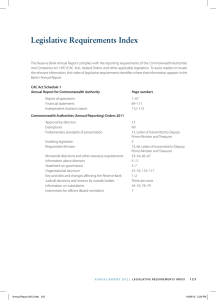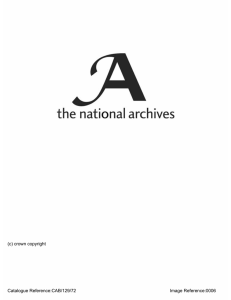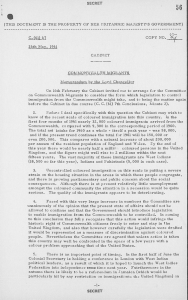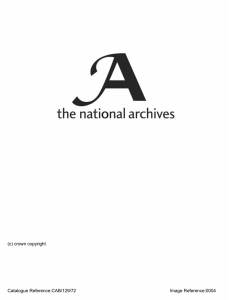(c) crown copyright Catalogue Reference:CAB/128/35 Image Reference:0055
advertisement
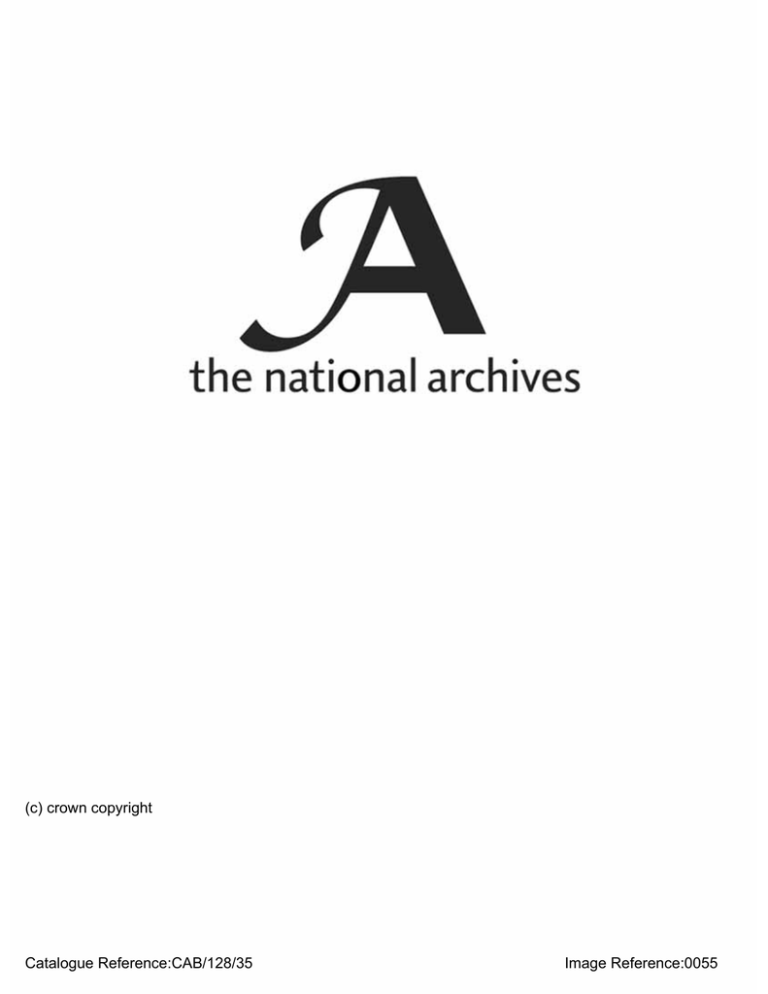
(c) crown copyright Catalogue Reference:CAB/128/35 Image Reference:0055 THIS DOCUMENT IS T H E PROPERTY OF HER BRITANNIC MAJESTVS GOVERNMENT Printed for the Cabinet. October 1961 CC. (61) 55(h Conclusions Copy No, I g CABINET CONCLUSIONS of a Meeting of the Cabinet held at Admiralty House, S.W.1, on Tuesday, 10th October, 1961, at 1130 a.m. Present: The Right Hon. HAROLD MACMILLAN, M.P., Prime Minister The Right Hon. R. A. BUTLER, M.P., Secretary of State for the Home Department The Right Hon. The EARL OF H O M E , Secretary of State for Foreign Affairs The Right Hon. JOHN MACLAY, M.P., Secretary of State for Scotland The Right Hon. IAIN MACLEOD, M.P., Chancellor of the Duchy of Lancaster The Right Hon. Sir DAVID ECCLES, M.P., Minister of Education The Right Hon. LORD M I L L S , Minister without Portfolio The Right Hon. JOHN HARE, M.P., Minister of Labour The Right Hon. VISCOUNT KILMUIR, Lord Chancellor The Right Hon. VISCOUNT HAILSHAM, Q.C., Lord President of the Council and Minister for Science The Right Hon. DUNCAN SANDYS, M.P., Secretary of State for Commonwealth Relations i The Right Hon. HAROLD WATKINSON, I M.P., Minister of Defence j The Right Hon. PETER THORNEYCROFT, M.P., Minister of Aviation The Right Hon. REGINALD MAUDLING, M.P., Secretary of State for the Colonies The Right Hon. ERNEST MARPLES, M.P., Minister of Transport The following were also present: The Right Hon. Sir ' The Right Hon. MARTIN REDMAYNE. M.P.. Parliamentary Secretary. Attorney-General (Item 3) Treasury Sir EDWARD BOYLE, M . P . , Financial Secretary. Treasury (Items 3-7.) MANNINGIIAM-BULLER, REGINALD Q.C., M.P.. Secretariat: The Right Hon. Sir NORMAN BROOK Mr. J. H. Mr. A. M. WADDELL MACKINTOSH CONTENTS Minute No. 1 Subject Foreign Affairs Page 3 Syria Laos Congo Republic United Nations Berlin 2 United Nations 3 Colonialism 3 Commonwealth Immigrants 4 4 Ghana 5 Relations with the United Kingdom The Quecn's Visit 5 Malaya 7 Greater Malaysia 6 British Transport Commission 7 Hotels Company 7 Council of Europe European Social Charter 8 Foreign Affairs Syria (Previous Reference: C.C. (61) 53rd Conclusions. Minute 3) Laos (Previous Reference: C.C. (61) 53rd Conclusions. Minute 2) Congo Republic (Previous Reference: C.C. (61) 52nd Conclusions. Minute 2) United Nations (Previous Reference: C.C. (61) 51st Conclusions, Minute 2) Berlin (Previous Reference: C.C. (61) 53rd Conclusions, Minute 4) 1. The Foreign Secretary said that it was now evident that President Nasser would not seek forcefully to prevent the secession of Syria from the United Arab Republic. He had indicated that he would not-oppose the admission of Syria, as a separate State, to the Arab League or the United Nations. There was therefore no reason to delay any longer our formal recognition of the separate Government of Syria. He proposed to arrange that we should act simultaneously with some Allied Governments in according this recognition. Good progress had been made at the meeting of the three Laotian Princes, and agreement had finally been reached that Prince Souvanna Phouma should be the Prime Minister of a united Laotian Government. This solution had not at first been welcomed by the King of Laos, but there was some reason to hope that he would be persuaded to accept it. Mr. Tshombe, the Prime Minister of the provincial government of Katanga, had now sent a message to Mr. Adoula, the Prime Minister of the Central Congo Government, indicating his readiness to send a delegation to undertake negotiations in Leopoldville. Mr. Adoula was understood to have responded favourably to this approach. Mr. Tshombe might even be willing to go to Leopoldville himself, if he could obtain satisfactory assurances about his personal safety. These developments were promising. Soviet opposition now seemed to be hardening against the appointment of a single Secretary-General of the United Nations in succession to Mr. Hammarskjold. The Soviet Government seemed likely to revive their proposal for placing the Secretariat under the control of three individuals drawn, respectively, from the Communist, Western and neutral countries. It might therefore be necessary to continue for a further period the temporary arrangement by which a number of Deputy Secretaries took charge of the Secretariat. President Kennedy and the United States Secretary of State, Mr. Rusk, had held in Washington some further discussions on Berlin with the Soviet Foreign Minister, Mr. Gromyko. As a result it had been agreed that there should be a further bilateral exchange of views on this problem, between the United States and the Soviet Union, before any attempt was made to convene a wider meeting; and these conversations would be held in the near future in Moscow. It was desirable that, before they began, the United States Ambassador in Moscow should be aware of the latest views held by the Governments of the United Kingdom, France and Western Germany on the main points at issue, and it was proposed that a meeting of senior officials of the four Governments should be held for this purpose in the course of the next few days. The Foreign Secretary said that he would circulate, for the information of the Cabinet, a memorandum summarising the course of the latest discussions on Berlin. United Nations (Previous Reference: C.C.(6t)5lst Conclusions. Minute 2) Colonialism 2. The Prime Minister said that he had considered with the Ministers directly concerned whether we could safely support a resolution which the Nigerian Government were proposing to bring forward at the General Assembly of the United Nations declaring (hat all dependent territories in Africa should become independent by !970. It was inevitable that some resolution hostile to Colonialism should be moved at the General Assembly, and it might therefore be to our advantage to encourage the Nigerians to take this moderate initiative. The terms of their resolution were broadly acceptable to us and we should be able to vote for it if it remained in its present SECKF.T form and, in particular, was not extended beyond Africa or advanced in time to a date earlier than 1970. It would, however, be necessary for our representative to make it clear, when speaking on the resolution, that we endorsed it as a general aim but were not committed to any particular form of independence (e.g., federalism must not be excluded) and might have to take account of special circumstances affecting the timing of independence for individual territories—the High Commission Territories, for instance, might not be ready for independence by 1970. The Cabinet— Invited the Foreign Secretary to authorise the United Kingdom representative at the United Nations to assure the Nigerian representative that we should be prepared in principle to support the resolution on Colonialism in Africa which he was thinking of moving in the General Assembly so long as it remained in its present form. Commonwealth Immigrants (Previous Reference: C C . (61) 29th Conclusions. Minute 7) 3. The Cabinet considered a memorandum by the Home Secretary (C. (61) 153) recommending the introduction of legislation to control immigration into the United Kingdom from other parts of the Commonwealth. A draft Bill was annexed to the memorandum. The Home Secretary said that the Commonwealth Migrants Committee had given long and careful consideration to this problem, in the light of the increasing flow of coloured Commonwealth immigrants into this country, and had come reluctantly to the conclusion that powers must now be taken to control this movement. The figures had risen from 21,000 in 1959 to nearly 58,000 in 1960; the latest monthly figure, for August of this year, was the highest on record at nearly 16,000, and the estimated total for 1961 was well over 100,000. This trend had already given rise to serious problems, particularly in connexion with housing, and it was evident that the country could not assimilate coloured immigrants on the present scale. There was growing public anxiety about the position and mounting pressure from Government supporters for some measure of control. The Commonwealth Migrants Committee recommended a form of control related to employment. Coloured immigrants having jobs to go to or qualifications likely to be useful in this country would be freely a d m i t t e d - a s would students, visitors and persons able to support themselves without taking employment. Others would, however, be subject to a numerical quota which would be determined by the Government and varied from time to time according to the country's need of manpower. This method of control would not result in a dramatic reduction of the flow of coloured immigrants and it would not therefore satisfy all critics of the present situation, but it would make it possible to bring the situation under control. The Bill itself applied to all Commonwealth citizens, irrespective of colour; but it would be evident in its operation that the control was being applied in practice only to coloured people. The Legislation Committee had considered whether it would be preferable to proceed by an enabling Bill leaving the detailed provisions to be enacted by Order in Council; but they had concluded that, in view of the controversial nature of the subject, this would only serve to increase the Parliamentary difficulties. They therefore recommended that legislation should be introduced in the form of the draft Bill annexed to the Home Secretary^ memorandum In discussion the following points were made (f/l The Bill would provoke some criticism from other Commonwealth countries, but this was preferable to the continuing CC. 55 (61) risk of ill-feeling over incidents in this country involving coloured Commonwealth immigrants. The Premier of Jamaica had already been told in confidence that the Government were contemplating the introduction of this control and had received the news without surprise. It would be desirable that all other Commonwealth Governments should be given advance warning that this control was likely to be introduced. (b) The variable quota for immigrants without special skills and with no specific employment in view would expose the Government to constant pressure to increase or decrease the numbers to be admitted. This provision was, however, inevitable if the flow was to be adjusted to meet the needs of the national economy. (c) The Bill would empower a court to recommend the deportation of a Commonwealth citizen who had lived in this country for less than five years, did not belong to this country by birth, descent or naturalisation and had been convicted of an offence carrying liability to imprisonment. The Legislation Committee had suggested that this provision might be extended to enable a court to recommend the deportation of a Commonwealth immigrant even if he had lived in this country for more than five years. It was however arguable that, if the power of the courts were not limited by reference to any particular period of residence, too wide a discretion would be left to the Home Secretary. Further thought should be given to this point. UD A resolution on this subject was to be debated at the Conservative Party Conference on the following day. The Home Secretary, in speaking on this resolution, could indicate that the Government were concerned at the situation and might well find it necessary to take steps to control it. He would however avoid implying that the Government had already decided to introduce legislation on this subject—so as to avoid anticipating The Queen's Speech and also to give the Commonwealth Secretary an opportunity to advise other Commonwealth Governments that this control might have to be imposed. The Cabinet— (I) Agreed that legislation should be introduced in the forth­ coming session of Parliament, on the lines proposed in C. (61)153, to control immigration into the United Kingdom from other parts of the Commonwealth. (2) Invited the Home Secretary to consider further, in consultation with the Lord Chancellor and the AttorneyGeneral, whether this legislation should empower the courts to recommend the deportation of Commonwealth citizens who had lived for more than five years in the United Kingdom. (3) Authorised the Commonwealth Secretary to warn other Commonwealth Governments that the United Kingdom Government were likely to find it necessary to take steps to control immigration into this country from other parts of the Commonwealth. Chana (Previous Reference: 4 The Cabinet had before them a note by the Commonwealth Secretary (C. (61) 157) covering the text of a joint statement issued t the end of his recent talks with President Nkrumah. a C C . i(.H 52nd Conclusions. Minute ft) Relations with the United Kingdom The Commonwealth Secretory informed the Cabinet of the impressions which, he had formed from these talks. He believed that they had removed some of ihe misunderstandings which had arisen. and he had been glad to be able to persuade President Nkrnmah to put publicly on record a more generous appreciation of the Colonial policy of the United Kingdom Government. It was however to be expected that leading members of the Ghana Government would continue to make public statements which were irresponsible or embarrassing to the United Kingdom Government, though he hoped to be able to reduce this embarrassment by closer and more frequent consultation. T h e Oueen's V i s i t X \ \ . * The Commonwealth Secretary said that, in view of the unsettled political conditions in Ghana, he had considered whether it would be right to advise The Queen to cancel her projected visit to that country. He had no doubt that The Queen would be accorded an enthusiastic public welcome in Ghana. A visit by the Head of the Commonwealth would strengthen the ties between the people of Ghana and the other peoples of the Commonwealth. It could not properly be construed as an endorsement of the policies of President Nkrumah. On the other hand, if it could be said that The Queen had cancelled her visit on account of increased political opposition to the present Government of Ghana, this would be regarded as an intervention in Ghana's domestic affairs and the relations between the United Kingdom and Ghana would be seriously prejudiced. These effects would be increased if The Queen carried out the rest of her projected tour in West Africa, without visiting Ghana; and, if she decided not to go to Ghana, it would be preferable that she should cancel the whole of the West African tour. Thus the balance of the political considerations lay against making any modification of the projected tour. The issue therefore turned on the assessment of the risk to The Queen's personal safety which her stay in Ghana would entail. He had made very careful enquiries into this during his recent visit to Accra. He had gone into it in detail, not only with the High Commissioner and his staff, but with the head of the Special Branch of the Police and with leading British residents in official and business circles. All those whom he had consulted were satisfied that The Queen would not be exposed to any increased risk because of recent political developments in Ghana. Some degree of risk was inseparable from Royal visits of this kind, but there was no reason to believe that this would be any greater in Ghana than in other countries which Her Majesty had already visited. In discussion there was general agreement that the balance of political advantage lay in favour of advising Her Majesty that her West African tour should be carried through as planned. The Cabinet were conscious of the heavy responsibility which they bore in respect of The Queen's personal safety. There was, however, no reason to apprehend that any violence would be directed against The Queen herself: the risk arose rather from the fact that President Nkrumah's political opponents might have, during The Queen's visit, opportunities for violence against him which would not ordinarily be available to them. This risk could, however, be reduced if the number of occasions on which President Nkrumah travelled in the same car as Her Majesty were limited. The Cabinet's conclusion was that, while additional precautions should be taken to ensure The Queen's safety during her visit to Ghana, there were at present no sufficient grounds for advising her to cancel that visit. The C a b i n e t ­ (1) Took note that the Prime Minister would advise Her Majesty in the sense of the conclusion recorded above. (2) Agreed that this question should be reviewed again nearer the date of The Queen's departure in the light of further developments in the local situation. CC. 55 (61) Malaya (Previous Reference: C C . (57) 5ist Conclusions, Minute 8) Greater Malaysia 5. The Commonwealth Secretary said that the Prime Minister of Malaya, Tunku Abdul Rahman, was increasingly concerned about the situation in Singapore, where the Government were losing ground to their Communist opponents and now had a majority of only one j the Legislative Assembly. In order to stabilise the position the Tunku was anxious to secure a merger of Singapore with the Federation while there was still a Government in Singapore with which he could co-operate, but he would be unwilling to contemplate such a merger unless it could include the British Borneo territories whose non-Chinese populations would help to maintain the racial balance against the Chinese population of Singapore. He was now pressing for our immediate agreement to the inclusion of the Borneo territories in such a " Greater Malaysia ". Earlier this year he had suggested that he should come to London to discuss this project, and he now seemed ready to make such a visit in the near future. n In discussion it was recognised that the defence interests of the United Kingdom in this area might, on balance, be better served by promoting the creation of a Greater Malaysia on the lines now envisaged than by leaving Singapore to claim independence as a separate unit. The Cabinet— Agreed that it was desirable that the Prime Minister of Malaya should visit London in the near future to discuss the project for a Greater Malaysia. British Transport Commission (Previous References: C C . (61) 41st Conclusions, Minute 8 and C C . (60) 63rd Conclusions) Hotels Company 6. The Cabinet had before them a memorandum by the Minister of Transport (C. (61) 139) proposing that in the forthcoming reorganisation of British Railways the hotels owned by the British Transport Commission should be made the responsibility of a company owned by the British Railways Board. The Minister of Transport said that, in the White Paper (Cmnd. 1248) on the Reorganisation of Nationalised Transport Undertakings, it had been stated that the British Transport hotels would be incorporated as a company under the Companies Act and placed under the control of the Holding Company. An independent structure of this kind would, it had been thought, increase the commercial freedom of the hotels and remove them from the over­ riding influence of railway requirements and would also allow the British Railways Board to concentrate on running the railways. Such a structure would be welcomed by many of the Governments supporters and the proposal in the White Paper had been accepted at the outset by Dr. Beeching, the Chairman of the British Transport Commission. On further reflection, however. Dr. Beeching had come to the view that the hotels should be controlled by the British Railways Board. If they were under separate control there would be difficult problems where hotels were physically part of railway stations. Separate organisation, moreover, would make it impossible to retain the financial advantages (estimated at £25O.00Q a year) of central buying and common maintenance arrangements. The Minister said that on balance he was inclined to accept Dr. Beeching's advice on these points. So long as the hotels were run as a separate company, ownership of the company by the Railways Board would not prevent them from being operated efficiently and he did not think that this need distract the Railways Board from their main task of running the railways. To put the hotels within the control of the Railways Board would, moreover, enable him to concede a point to the trade unions, who were most anxious to ensure that the staff employed in hotels could continue to be covered by the established machinery for wages, pensions and superannuation applying to railway staff. In discussion there was general agreement that Dr. Beeching's advice should be accepted. It would be important, however, to ensure that the British Railways Board did not in time become unduly pre­ occupied with their hotel interests. The legislation to be introduced in the coming session should prevent the company from developing new hotels save where these were required for railway passengers and should empower the Minister to secure the discontinuance of any particular activity by the Hotels Company. It should also be clearly established that the Company would be expected to dispose of the free-standing hotels if good offers were made. With these points in mind it would be necessary to scrutinise carefully the Memorandum and Articles of Association of the Hotels Company. The Cabinet— Approved the proposal in C. (61) 139 that provision should be made for the British Transport Commission^ hotels to be run by a company owned and controlled by the British Railways Board. Council of Europe (Previous Reference: C C . (60) 50ih Conclusions. Minute 9) European Social Charter 7. The Cabinet had before them a memorandum by the Foreign Secretary (C. (61)156) proposing that the United Kingdom Government should ratify the European Social Charter, the text of which was annexed. The Cabinet were informed that this Charter, which had been prepared by the Council of Europe, was largely concerned with labour matters but also contained provisions on health, social security and social welfare. It brought together in one document a statement of rights and principles which were for the most part already recognised, in the European Convention on Human Rights or otherwise, by the member countries of the Council of Europe. The Charter would thus become a manifestation of the social rights and standards common to Western Europe. The Government Departments concerned, including those in Northern Ireland, had been consulted in the drafting stages and had examined the final text. The declaration of aims in Part I of the Charter could be accepted without difficulty; and. although one or two of the specific articles in Part II were drafted in terms stronger than might have been wished, a large majority of them could be accepted. The United Kingdom would be in a position to comply with the requirements for ratification of the Charter. He suggested that it should be signed on behalf of the United Kingdom at a ceremony which had been arranged for 18th October and that it should be ratified in due course. The undertakings given would apply to British subjects in the United Kingdom and to nationals of other Contracting Parties lawfully resident in this countrv. The Cabinet Approved the proposal in C. (61) 156 that the Europe.in Social Charter should be signed and in due course ratified on behalf of the United Kingdom.
